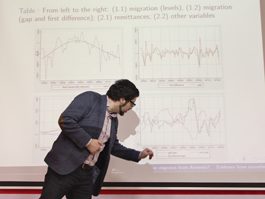On 22 April, 2014, ISET hosted Dr. Maryam Naghsh Nejad, from the Institute for the Study of Labor, Bonn, who presented her paper “Does Suburbanization cause obesity?”.
In recent years the population in metropolitan areas of the United States has increased. At the same time, the population living in the central areas of cities declined, implying that those people moving to metropolitan areas prefer to live in suburban areas. Dr. Nejad explored whether this choice to live in suburban areas has caused the recent increase of the obesity rate.
On April 7, 2014, ISET hosted Dr. Aleksandr Grigoryan from the American University of Armenia, who presented his paper “Who else emigrates from Armenia? Evidence from intentions”. The paper addressed two main questions: what influences decision making as to whether to migrate? What was the main trend during recent years?
The literature suggests different explanations for the incentives to migrate, like the wage gap between the home country and country of destination or receiving remittances from abroad. Dr. Grigoryan decided to focus on remittances, exploring the relationship between the later and intensions to migrate in Armenia.
On April 3, 2014, ISET hosted Prof. Stephan von Cramon-Taubadel from the University of Göttingen, who presented his paper "European Consumers’ Willingness to Pay for Israeli-Palestinian Peace Products".
The main finding of the paper is that the ethical side of food products have become increasingly important for Western European consumers. One example of the trend of ethical consumption are “peace products”, commodities produced in peaceful economic cooperation between members of conflicting parties in areas of political conflict. In the context of the Israeli-Palestinian conflict, Prof. von Cramon-Taubadel investigated the willingness of consumers from four European countries to pay for two food products jointly produced by Israelis and Palestinians.













